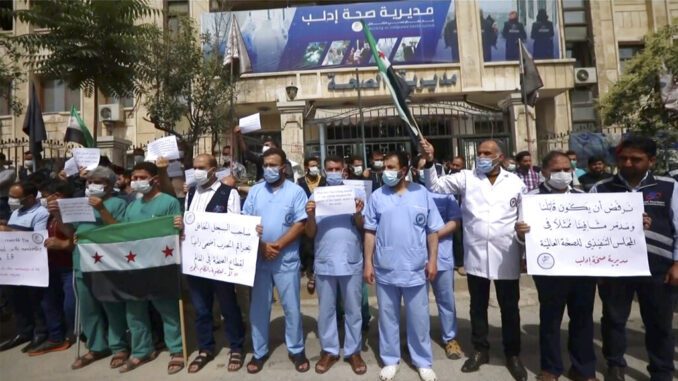
BEIRUT — Dozens of medical workers in rebel-held northwest Syria on Monday protested a decision to grant President Bashar Assad’s government a seat on the executive board of the World Health Organization. They said Assad is responsible for bombing hospitals and clinics across the war-ravaged country.
The decision to give Syria a seat came a decade into the country’s devastating civil war that has left untold numbers of civilians — including many health care workers — dead and injured.
The selection of Syria at a little-noticed session Saturday of the WHO’s annual assembly — which brings together all member states of the U.N. health agency — has evoked outrage in opposition-held Idlib province.
Rifaat Farhat, a senior health official in Idlib, said the move “contradicts all international and humanitarian laws.”
Syria was among 12 WHO member states that were chosen to appoint new members for the 34-member board in an assembly vote that faced no debate or opposition.
Syria will take up the seat for the executive board’s next session, which begins Wednesday.
The revelation was highlighted by the advocacy group UN Watch, which keeps tabs on perceived hypocrisies and other shortcomings of the world body and its affiliated organizations like WHO.
The board is largely a technical group whose role is to carry out the decisions of, and advise, the assembly, which is made up of all WHO member states and has been meeting since May 24.
“We reject the idea that our killer and he who destroyed our hospitals be represented on the executive board,” read a banner carried by some of the protesters in Idlib on Monday. Some two dozen medical staff members protested outside the main health department.
Citizen journalist Salwa Abdul-Rahman, who is based in Idlib province — the last rebel stronghold in the country — said he worried a representative of the government could work on cutting medical assistance to the region that is home to millions of people.
Syria’s war has left half a million people dead and driven millions out of the country since the conflict erupted in 2011. Investigators working for the U.N.’s main human rights body and international advocacy groups have reported that the Assad government and its allies — like Russia and Iran — have been responsible for the destruction of health care facilities as part of the years of fighting.
Hundreds of medical facilities have been bombed, mostly in government airstrikes; half the hospitals and health centers are functioning only partially or not at all, while 70% of the medical personnel have fled the country.
A WHO emergency appeal for Syria issued in March said at least 12.4 million people are in need of assistance in Syria, and the “essential health service infrastructure such as hospitals and health care centers are in a state of disrepair.”
By the end of December, it said, only half of the country’s assessed public hospitals were reported to be fully functioning. Up to half of Syria’s health care workforce has left the country.



